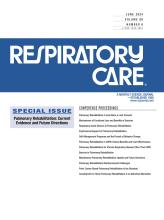This article requires a subscription to view the full text. If you have a subscription you may use the login form below to view the article. Access to this article can also be purchased.
Abstract
A self-management intervention is a personalized approach to individuals aiming to engage individuals in a behavior change to develop skills to live better with their condition. Self-management involves an iterative process between participants and providers in which goals are formulated and feedback is given. All respiratory societies advocate self-management as part of chronic care because it may improve quality of life and health-care utilization. Self-management is an integral part of pulmonary rehabilitation. Self-management interventions usually involve education and exercise prescription, and that is an asset of current programs; however, recent reports indicate that effective strategies for motivation and a behavior change focus are often missed. A recent systematic review on self-management urges the need for a specific aspect and characteristic of self-management interventions: iterative interactions between participants and health-care professionals competent in using behavior change practices to elicit participants’ motivation, confidence, and competence to develop skills to better manage their disease. A recent review of self-care intervention in chronic disease states that the major deficits found in self-care interventions included a lack of attention and/or innovation to the psychological consequences of chronic illness, technology, and behavior change techniques to help patients manage symptoms. There is a need for exploration of mechanisms to explain the relationships between both anxiety and depression, and adherence to treatment in COPD. The latter is particularly appropriate for pulmonary rehabilitation, for which greater adherence is needed. This report aims to introduce basic aspects of behavior change and a proposed roadmap to introduce behavior change into pulmonary rehabilitation and chronic care programs.
- behavior change
- cardiac rehabilitation
- chronic disease management
- COPD
- health coaching
- interstitial lung disease
- lifestyle
- pulmonary rehabilitation
- quality of life
- self-management
Footnotes
- Correspondence: Roberto P Benzo MD MSc, Mindful Breathing Laboratory, Division of Pulmonary, Critical Care and Sleep Medicine, Mayo Clinic, 200 First St SW, Mayo Clinic, Rochester, MN 55902. E-mail: benzo.roberto{at}mayo.edu
Dr Benzo is supported by grant R01 HL140486 from the National Heart Lung and Blood Institute, the National Institutes of Health (Benzo PI).
Dr Benzo presented a version of this paper at the 60th Respiratory Care Journal Conference, Pulmonary Rehabilitation: Current Evidence and Future Directions, held June 22–23, 2023, in St. Petersburg, Florida.
- Copyright © 2024 by Daedalus Enterprises
Pay Per Article - You may access this article (from the computer you are currently using) for 1 day for US$30.00
Regain Access - You can regain access to a recent Pay per Article purchase if your access period has not yet expired.







